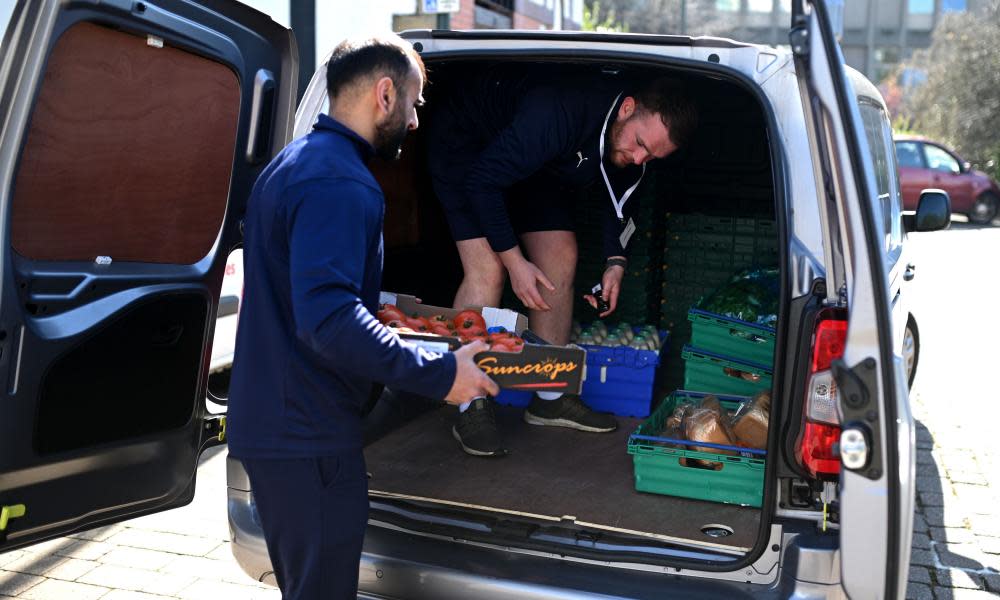My food bank used to offer human contact, but coronavirus has ended that

When I saw Nicola (not her real name) this week, I wanted to tell her how well she looked. I first met her last summer when she came to the food bank where I volunteer . Back then, her face was scabbed, she was thin, and her skin was pale and grey. Her husband had just died. It happened while she was in hospital having an operation. While she was there, she contracted a serious infection. She had young children at home. She was too contagious to work. She was referred to us by her social worker because of delays in her receiving universal credit. I gave her a bag of food, which didn’t feel to me to be enough.
When I saw Nicola the other day – despite looking better, she is still too ill to work – I waved at her. She shouted back: “I remember you!” Social distancing means I couldn’t get close enough to tell her I still think about her, and her children. At the food bank, in south London, we are doing everything we can to get food packages to people like Nicola who need them during lockdown.
I want to tell the embarrassed ones that it is not they who should be ashamed, but the government
I have been volunteering here when I can for about 18 months, which makes me sound like a far better person than I actually am. But I do it because I learned as a child that it is overwhelmingly the poor who pay for the mistakes of the rich. I was 10 when my family were made homeless, as the economy tanked in the mid-1990s, and we ended up in temporary accommodation. In my early 30s, a period of ill health landed me in a psychiatric hospital, I was declared unfit to work, and navigating universal credit became my full-time job. If I hadn’t been able to borrow money, I would have been in line at the food bank, too.
Usually, our food bank operates from a local church. It is busy, bustling, loud and chaotic. When lockdown began, the church closed, and we moved into the office space of Pecan – the charity that runs the food bank. Many of our volunteers are aged over 70, or have impaired immune systems, or are unwell in other ways. Our caseload has quadrupled in the past fortnight. We are asking for volunteer drivers to take packages to those in need who are self-isolating. Our clients are more desperate than ever, and so our work has become more stressful, sombre and purposeful.
Normally, when clients come to the church, we give them tea and a biscuit or – if one of the volunteers has brought any – cake. Their kids can play or read or hide under the church seats. We chat and laugh while they are waiting. Their lives are hard: we try not to make the effort of not starving even harder. All of our clients are referred to us via their social worker, GP or the jobcentre. We also help with benefits advice and a women’s group – and provide the simple, essential role of being there to listen.
During this pandemic however, food banks are unable to perform this vital, too often overlooked, role. Treating people like human beings. Smiling at them, looking them in the eye, showing them empathy rather than mistrust.
Now, our clients form two queues: one to hand over their slip to us, and another to collect their food. We ask them to wait outside on a busy high street, at two-metre intervals that have been marked out in masking tape on the pavement. Many of our clients work, and if they don’t almost all of them want to. “I hate this,” said one woman, a cleaner with two children who until two weeks ago worked in the City. “Everyone can see me, you know?” “You have nothing to be ashamed of,” I said, as I have said to many clients before her.
I want to tell the embarrassed ones that it is not they who should be ashamed, but the government. The architects of austerity and universal credit, who have abandoned the sick and the widowed and the unlucky and left them, quite literally at times, with nothing.
Related: How to help food banks during the coronavirus outbreak
One small advantage of our food bank taking up space on Peckham High Street, and of our volunteer drivers being seen dropping off food parcels, is that there has been an increase in people turning up with bags of donations. Nappies and soup and rice. More people are giving cash donations. It is still nowhere near enough – but still, it is more.
It often feels as though food banks, much like homeless hostels, act to shield the public from the most visible cruelty of austerity. I wish we didn’t exist – and let us not forget that food banks have not always existed, and certainly never in these numbers. But there is something to be said for the public opening their eyes to the fact that every week, in their communities, people stand, often with their kids in tow, queuing for food parcels in one of the richest countries in the world.
In the next few days, our food bank will move to doing home deliveries only. It’s the only safe way to continue. We may not be able to see our clients just now, or give them a biscuit and have a chat. But we are still here, we are still trying to smile, and we will be here until people like Nicola stop needing us.
• Donate to the Trussell Trust
• Jenny Stevens is a commissioning editor on Guardian Features


